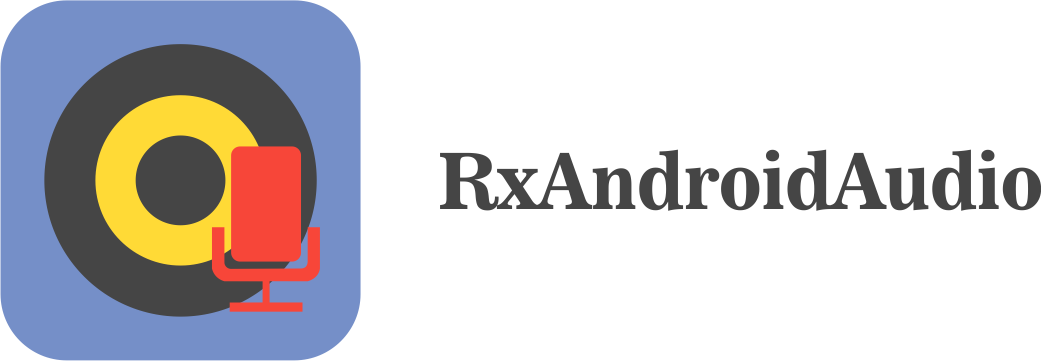Android Audio encapsulation library, with part Rx support.
This library use lambda expression, since com.android.tools.build:gradle:2.4.0, there is native support for lambda, so I use it instead of jack support or RetroLambda, if you have lambda issue during build, please upgrade your gradle-android into 2.4.0+, or use 1.5.1 of this library, thanks!
allprojects {
repositories {
maven {
url "http://dl.bintray.com/piasy/maven"
}
}
}
dependencies {
implementation 'com.github.piasy:rxandroidaudio:1.6.0'
implementation 'com.github.piasy:AudioProcessor:1.6.0'
}mAudioRecorder = AudioRecorder.getInstance();
mAudioFile = new File(
Environment.getExternalStorageDirectory().getAbsolutePath() +
File.separator + System.nanoTime() + ".file.m4a");
mAudioRecorder.prepareRecord(MediaRecorder.AudioSource.MIC,
MediaRecorder.OutputFormat.MPEG_4, MediaRecorder.AudioEncoder.AAC,
mAudioFile);
mAudioRecorder.startRecord();
// ...
mAudioRecorder.stopRecord();Note: If you record a aac file, the sound quality will be poor if the sample rate and encoding bit rate is low, the sound quality will increase when you set a bigger sample rate and encoding bit rate, but as the sound quality improve, the recorded file size will also increase.
With PlayConfig, to set audio file or audio resource, set volume, or looping:
mRxAudioPlayer.play(PlayConfig.file(audioFile).looping(true).build())
.subscribeOn(Schedulers.io())
.subscribe(new Observer<Boolean>() {
@Override
public void onSubscribe(final Disposable disposable) {
}
@Override
public void onNext(final Boolean aBoolean) {
// prepared
}
@Override
public void onError(final Throwable throwable) {
}
@Override
public void onComplete() {
// play finished
// NOTE: if looping, the Observable will never finish, you need stop playing
// onDestroy, otherwise, memory leak will happen!
}
});PlayConfig.file(audioFile) // play a local file
//.res(getApplicationContext(), R.raw.audio_record_end) // or play a raw resource
.looping(true) // loop or not
.leftVolume(1.0F) // left volume
.rightVolume(1.0F) // right volume
.build(); // build this config and play!mOutputFile = new File(Environment.getExternalStorageDirectory().getAbsolutePath() +
File.separator + System.nanoTime() + ".stream.m4a");
mOutputFile.createNewFile();
mFileOutputStream = new FileOutputStream(mOutputFile);
mStreamAudioRecorder.start(new StreamAudioRecorder.AudioDataCallback() {
@Override
public void onAudioData(byte[] data, int size) {
if (mFileOutputStream != null) {
try {
mFileOutputStream.write(data, 0, size);
} catch (IOException e) {
e.printStackTrace();
}
}
}
@Override
public void onError() {
mBtnStart.post(new Runnable() {
@Override
public void run() {
Toast.makeText(getApplicationContext(), "Record fail",
Toast.LENGTH_SHORT).show();
mBtnStart.setText("Start");
mIsRecording = false;
}
});
}
});Observable.just(mOutputFile).subscribeOn(Schedulers.io()).subscribe(new Action1<File>() {
@Override
public void call(File file) {
try {
mStreamAudioPlayer.init();
FileInputStream inputStream = new FileInputStream(file);
int read;
while ((read = inputStream.read(mBuffer)) > 0) {
mStreamAudioPlayer.play(mBuffer, read);
}
inputStream.close();
mStreamAudioPlayer.release();
} catch (IOException e) {
e.printStackTrace();
}
}
});mStreamAudioPlayer.play(
mAudioProcessor.process(mRatio, mBuffer, StreamAudioRecorder.DEFAULT_SAMPLE_RATE),
len);See full example for more details.
- Please follow my code style based on SquareAndroid

